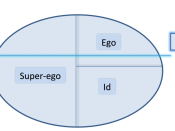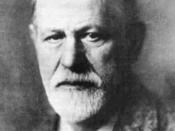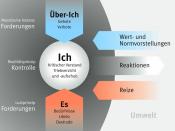Running head: SIGMUND FREUD AND PSYCHOANALYTIC THEORY 1
FROM PSYCHOANALYTIC THEORY TO LITERATURE 9
FREUD'S PSYCHOANALYTIC THEORY IN TERMS OF HUMAN TREATMENT AND ITS EFFECTS ON LITERATURE
Burçak Uluca
Kocaeli University
Author Note
This paper was prepared for Literary Theory and Criticism II, taught by Prof.Dr. Toprak
Abstract
Sigmund Freud is neurologist, psychiatrist and the father of the psychoanalysis theory. For him people are ill minded, they are not self-possessed. He distinguishes the conscious mind from unconscious mind. In addition, there is preconscious mind. The conscious mind is aware of everything. The unconscious mind is dangerous because it contains repressed feelings and thoughts. The feelings and thoughts in preconscious mind can be remembered by recalling. Second, he divides human treatment into three: Id, Ego, and Superego. The id is the animal side of personality because it is greedy and unsatisfied. The ego is the balance between id and superego.
The superego has moral principles and it is operative power on human life. According to Freud, in unconscious mind, the repressed, distorting feelings reveal at dreams, hypnosis, and literature.
Keywords: Freud, psychoanalysis theory, literature, daydreaming
FREUD'S PSYCHOANALYTIC THEORY IN TERMS OF HUMAN PERSONALITY AND ITS EFFECTS ON LITERATURE
Introduction
Sigmund Freud was an Austrian neurologist who became known as the founding father of psychoanalysis. After Copernicus's theory of universe and Darwin's theory of evolution, Freud gets a blow in humanity by saying that everybody is ill-minded and unconscious. Freud's basic thesis is that people are not self-possessed contrary to what is believed. People are not conscious of anything. This is the basis thesis of Freud. "Freud asserted that people's behavior is affected by their unconscious: "...the notion that human beings are motivated, even driven, by desires, fears, needs, and conflicts of which they are unaware" "("Quotes").
The iceberg...


